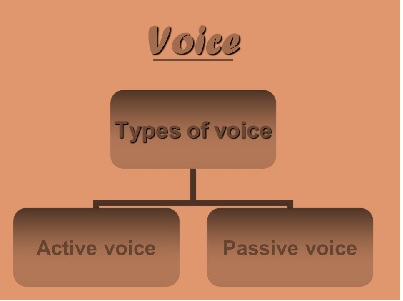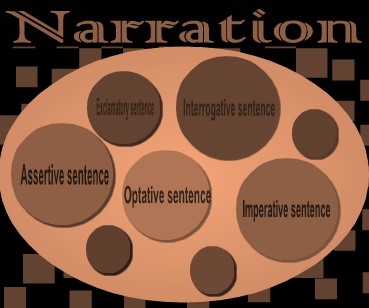
Voices can be categorized into active voice and passive voice.

|
Verbs are either active or passive in voice. In the active voice, the subject and verb relationship are straightforward: the subject is a do-er. In the passive voice, the subject of the sentence is not a do-er. It is shown with by + do-er or is not shown in the sentence. Passive Voice Passive voice is used when the action is the focus, not the subject. It is not important who does the action.
Passive voice should be avoided when you want more clarity in writing. However, in some cases, you need to use passive voice to stress the action, not the actor. Also, passive voice can be considered more polite, as it sounds less aggressive or dramatic.
Active Voice You can easily rewrite an active sentence to a passive sentence. The object in the active sentence becomes a subject in the passive sentence. The verb is changed to a “be" verb + past participle. The subject of the active sentence follows by or is omitted.
Sentences written in the active voice are easier to understand than sentences written in the passive voice. Switching the passive voice into the active voice is straightforward, but it requires a bit of practice. The tense of the verb to be in the passive voice is always the same as the tense of the main verb in the active voice. In order to use the active voice, you will have to make the subject of the action explicit. |
|
Tense |
Active voice |
Passive voice |
Active sentence |
Passive equivalent |
|
Simple present |
keep |
is kept |
I keep the butter in the fridge. |
The butter is kept in the fridge. |
|
Present continuous |
is keeping |
is being kept |
John is keeping my house tidy. |
My house is being kept tidy. |
|
Simple past |
kept |
was kept |
Mary kept her schedule meticulously. |
Mary's schedule was kept meticulously. |
|
Past continuous |
was keeping |
was being kept |
The theater was keeping a seat for you. |
A seat was being kept for you. |
|
Present perfect |
have kept |
have been kept |
I have kept all your old letters. |
All your old letters have been kept. |
|
Past perfect |
had kept |
had been kept |
He had kept up his training regimen for a month. |
His training regimen had been kept up for a month. |
|
Simple Future |
will keep |
will be kept |
Mark will keep the focus. |
The focus will be kept. |
|
Conditional Present |
would keep |
would be kept |
If you told me, I would keep your secret. |
If you told me, your secret would be kept. |
|
Conditional Past |
would have kept |
would have been kept |
I would have kept your bicycle here if you had left it with me. |
Your bicycle would have been kept here if you had left it with me. |
|
Present Infinitive |
to keep |
to be kept |
She wants to keep the book. |
The book wants to be kept. |
|
Perfect Infinitive |
to have kept |
to have been kept |
Judy was happy to have kept the puppy. |
The puppy was happy to have been kept. |
|
Present Participle & Gerund |
keeping |
being kept |
I have a feeling that you may be keeping a secret. |
I have a feeling that a secret may be being kept. |
|
Perfect Participle |
having kept |
having been kept |
Having kept the bird in a cage for so long, Jade wasn't sure it could survive in the wild. |
The bird, having been kept in a cage for so long, might not survive in the wild. |
|
Tense |
Active voice |
Passive voice |
Active sentence |
Passive equivalent |
|
Simple present |
keep |
is kept |
I keep the butter in the fridge. |
The butter is kept in the fridge. |
|
Present continuous |
is keeping |
is being kept |
John is keeping my house tidy. |
My house is being kept tidy. |
|
Simple past |
kept |
was kept |
Mary kept her schedule meticulously. |
Mary's schedule was kept meticulously. |
|
Past continuous |
was keeping |
was being kept |
The theater was keeping a seat for you. |
A seat was being kept for you. |
|
Present perfect |
have kept |
have been kept |
I have kept all your old letters. |
All your old letters have been kept. |
|
Past perfect |
had kept |
had been kept |
He had kept up his training regimen for a month. |
His training regimen had been kept up for a month. |
|
Simple Future |
will keep |
will be kept |
Mark will keep the focus. |
The focus will be kept. |
|
Conditional Present |
would keep |
would be kept |
If you told me, I would keep your secret. |
If you told me, your secret would be kept. |
|
Conditional Past |
would have kept |
would have been kept |
I would have kept your bicycle here if you had left it with me. |
Your bicycle would have been kept here if you had left it with me. |
|
Present Infinitive |
to keep |
to be kept |
She wants to keep the book. |
The book wants to be kept. |
|
Perfect Infinitive |
to have kept |
to have been kept |
Judy was happy to have kept the puppy. |
The puppy was happy to have been kept. |
|
Present Participle & Gerund |
keeping |
being kept |
I have a feeling that you may be keeping a secret. |
I have a feeling that a secret may be being kept. |
|
Perfect Participle |
having kept |
having been kept |
Having kept the bird in a cage for so long, Jade wasn't sure it could survive in the wild. |
The bird, having been kept in a cage for so long, might not survive in the wild. |

Q.1 |
Convert the Narration of the following: She said to me, "Let you work day and night, you can not beat me in the examination." |
| a) | She challenged me that even if I worked day and night, I could not beat her in the examination. |
| b) | She challenged me to work day and night,, still I could not beat her in the examination. |
| c) | She challenged me if I let be worked day and night, I can not beat her in the examination. |
| d) | She challenged me to work day and night, but would not beat her in the examination. |
Q.2 |
Convert the Narration of the following: She says to me, "You are, indeed, very clever." |
| a) |
She said to me that I am, indeed, very clever. |
| b) | She told me that I was, indeed, very clever. |
| c) | She tells me that I am, indeed, very clever. |
| d) | She tells me that I was, indeed, very clever. |
Q.3 |
Convert the Narration of the following: Krishna said, "Farewell, my friends." |
| a) | Krishna said that farewell to her friends. |
| b) | Krishna bade farewell to her friends. |
| c) | Krishna wished her friends farewell. |
| d) | Krishna exclaimed with joy that farewell to her friends. |
Q.4 |
Convert the Narration of the following- The teacher said, "Boys, if you want to pass, work hard." |
| a) | The teacher advised the boys to work hard, if they wanted to pass. |
| b) | The teacher told the boys that if they wanted to pass they should work hard. |
| c) | Both a and b |
| d) | none of the above |
Q.5 |
Convert the Narration of the following- The administrator said, "Hush! listen to me!" |
| a) | The administrator ordered that do listen to him. |
| b) | The administrator called to listen to him. |
| c) | The administrator called for our attention to let him to be listened. |
| d) | The administrator called for our attention and advised us to listen to him. |
Q.6 |
Convert the Narration of the following- Master said to servant, "Go down to the bazar." |
| a) | Master ordered servant to go down to the bazar. |
| b) | The master told servant that went down to bazar. |
| c) | Master said to servant that go down to the bazar. |
| d) | Master requested servant to go down to the bazar. |
Q.7 |
Convert the Narration of the following: Father said to Mohit, "Dear, why are you sad today?" |
| a) | Father asked Mohit lovingly why he was sad that day. |
| b) | Father asked Mohit lovingly why was he sad today. |
| c) | Father asked Mohit lovingly he is sad that day. |
| d) | Father asked Mohit lovingly why was he sad that day. |
Q.8 |
Convert the Narration of the following: The Captain said, "Bravo! you have done well." |
| a) | The Captain exclaimed with joy that he had been done well. |
| b) | The Captain exclaimed with wonder that he has done well. |
| c) | The captain applauded him saying that he had done well. |
| d) | none of the above |
Q.9 |
Convert the Narration of the following: Manu said to his friend, "Why help him now?" |
| a) | Manu asked his friend why to help him then. |
| b) | Manu asked his friend that it was no use of helping him now. |
| c) | Manu told his friend that why to help him now. |
| d) | Manu told his friend that it was no use of helping him then. |
Q.10 |
Convert the Narration of the following- I said to my friend, 'Do not go out in dark". |
| a) | I said to my friend did not go out in dark. |
| b) | I forbade my friend to go out in dark. |
| c) | I warned my friend from going out in dark. |
| d) | I told my friend do not go out in dark. |
Your Score: 0/10
Yearlong program for Olympiads preparation & to build necessary skills for future.
Explore More
Time to mark your calendar with the upcoming Olympiads exam schedule.
Explore More
Take your Olympiad preparation to next-level by taking LIVE Classes.
Explore More
Assess your performance by taking topic-wise and full length mock tests.
Explore More
Online tuitions for international compeitions like SASMO, SEAMO, etc for Grades 1-11.
Explore More